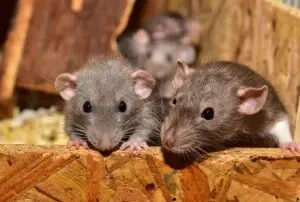Owning a pet is an immensely rewarding experience, and while most people automatically think of dogs, cats, or even fish, pet rats are increasingly gaining popularity for their intelligence, affectionate nature, and unique charm. Often misunderstood, rats can be exceptional pets for both seasoned and first-time pet owners. This article explores the benefits of having a pet rat, their care requirements, and why they might be the perfect companion for you.
1. Rats: A Brief Introduction
Before diving into the benefits of pet rats, it’s important to understand what makes them special. Domesticated rats (Rattus norvegicus domestica) differ greatly from their wild counterparts. They are bred for companionship and are far cleaner and friendlier than the stereotypes suggest.
- Lifespan: 2-3 years
- Size: 9-11 inches long, including the tail
- Personality: Intelligent, affectionate, and sociable
2. Benefits of Owning a Pet Rat
2.1. Highly Intelligent Companions
Rats are incredibly intelligent animals. Their cognitive abilities are often compared to those of dogs. Here’s why:
- Trainability: Rats can learn their names, respond to commands, and even perform tricks like jumping through hoops or retrieving objects.
- Problem-Solving Skills: Their ability to navigate mazes and solve puzzles makes them fascinating pets to engage with.
- Interactive Play: Rats enjoy games and mental stimulation, making them active and entertaining companions.
2.2. Affectionate and Social Animals
One of the biggest misconceptions about rats is that they’re aloof or unfriendly. On the contrary, domesticated rats are social and form strong bonds with their owners.
- Cuddling and Grooming: Rats often groom their owners, a sign of affection in the animal kingdom.
- Recognition: They recognize their owners by sight, scent, and sound, often running to greet them.
- Playfulness: Rats enjoy interacting with their owners, whether it’s climbing on shoulders or playing games.
2.3. Low Maintenance Pets
Compared to larger pets like dogs or cats, rats require less space, fewer resources, and less time for daily care.
- Diet: Rats thrive on a balanced diet of commercial rat food, fresh fruits, and vegetables.
- Space Requirements: A medium-sized cage with proper bedding and enrichment is sufficient.
- Minimal Grooming: Rats groom themselves and rarely require baths.
2.4. Cost-Effective Companionship
Rats are a budget-friendly option for those seeking a pet:
- Initial Cost: Rats and their supplies are relatively inexpensive.
- Vet Visits: While occasional check-ups are necessary, they are generally hardy animals with minimal health issues if cared for properly.
2.5. Ideal for Small Living Spaces
For people living in apartments or dorms, rats are an excellent choice. They don’t need large yards or extensive outdoor activities, making them well-suited for urban dwellers.
2.6. Good for First-Time Pet Owners
Rats are easy to care for and adapt well to human interaction, making them perfect for those new to pet ownership.
3. Health Benefits of Having a Pet Rat
3.1. Reduces Stress and Anxiety
Like other pets, rats provide emotional support and companionship, helping to reduce stress. The simple act of watching a rat explore or snuggle can be therapeutic.
3.2. Encourages Responsibility
Caring for a rat teaches responsibility, particularly for children. Daily feeding, cage cleaning, and interaction create a structured routine.
3.3. Enhances Social Skills
Rats are social creatures and often encourage their owners to develop better social habits, such as being attentive, caring, and empathetic.
4. Rat Care Essentials
4.1. Housing Requirements
A rat’s home is its sanctuary, and providing a safe, enriching environment is essential.
- Cage: Choose a multi-level wire cage with a solid floor.
- Bedding: Use safe, absorbent bedding like paper-based products or aspen shavings.
- Enrichment: Include tunnels, hammocks, chew toys, and climbing structures to keep your rat mentally stimulated.
4.2. Feeding Your Rat
A proper diet ensures your rat stays healthy and active.
- Staple Diet: Commercial rat pellets or blocks
- Fresh Food: Provide fruits, vegetables, and occasional treats like cooked eggs or nuts.
- Hydration: Always supply clean water in a bottle or bowl.
4.3. Regular Health Checks
Monitor your rat’s health to catch potential issues early.
- Symptoms to Watch For: Sneezing, lethargy, or loss of appetite
- Veterinary Care: Find a vet experienced with small animals or exotic pets.
5. Common Myths About Pet Rats
5.1. Myth: Rats Are Dirty
Reality: Domesticated rats are exceptionally clean, grooming themselves multiple times a day.
5.2. Myth: Rats Bite Frequently
Reality: Well-socialized rats rarely bite. They are more likely to nibble gently out of curiosity.
5.3. Myth: Rats Smell Bad
Reality: With regular cage cleaning, pet rats have no noticeable odor.
5.4. Myth: Rats Carry Diseases
Reality: Domesticated rats are not disease carriers if obtained from reputable breeders or rescues
6. Training Your Pet Rat
Training your rat can strengthen your bond and provide mental stimulation for them. Here’s how to get started:
6.1. Teaching Basic Tricks
- Use treats like small pieces of fruit to reward desired behavior.
- Start with simple tricks, such as coming when called or climbing onto your hand.
6.2. Litter Training
Rats can be trained to use a specific corner of their cage for waste, making cleaning easier.
6.3. Socializing Rats
Spend at least an hour a day interacting with your rat to build trust and prevent boredom.
7. Are Rats Good Pets for Kids?
Rats are fantastic pets for children due to their gentle nature and interactive behavior. However, adult supervision is crucial to ensure the rat’s safety and well-being.
- Pros: Teaches empathy, responsibility, and care.
- Cons: Young children might unintentionally mishandle a rat, causing stress or injury.
8. Pair or Solo: Should You Get One or More Rats?
Rats are social animals and thrive in pairs or small groups. Keeping two or more rats together prevents loneliness and promotes natural behaviors.
- Best Practice: Adopt rats of the same sex to prevent unplanned litters.
- Interaction: Even in pairs, human interaction is vital for their happiness.
9. Adopting vs. Buying a Pet Rat
Whether you choose to adopt from a shelter or buy from a breeder, both options have advantages.
- Adopting: Provides a home to rats in need and supports animal welfare.
- Buying: Ensure the breeder is reputable and prioritizes the health of their animals.
10. Challenges of Owning a Pet Rat
While rats are amazing pets, they come with certain challenges.
- Short Lifespan: Their 2-3 year lifespan can be emotionally challenging for owners.
- Health Issues: Rats are prone to respiratory infections and tumors, requiring prompt veterinary care.
- Daily Interaction: They require regular attention and playtime to stay happy.
11. Why Pet Rats Are Gaining Popularity
Pet rats are becoming more popular due to increased awareness of their intelligence, affectionate nature, and suitability for modern lifestyles. They challenge traditional notions of what makes a great pet and prove that good things come in small packages.
12. FAQs About Pet Rats
12.1. Are rats safe pets for children?
Yes, but children should be supervised to ensure the rat is handled gently and safely.
12.2. Do rats get along with other pets?
Rats may coexist with some pets, but introductions should be cautious and supervised.
12.3. How much time do rats need daily?
Rats need at least one hour of interaction and playtime daily.
12.4. What’s the best bedding for a rat?
Use paper-based or aspen bedding; avoid pine or cedar as they can harm your rat’s respiratory system.
12.5. How can I keep my rat entertained?
Provide toys, climbing structures, and regular interaction.
12.6. Are rats nocturnal?
Rats are crepuscular, meaning they are most active at dawn and dusk, but they can adapt to their owner’s schedule.
13. Conclusion: Why Choose a Pet Rat?
Rats are intelligent, affectionate, and low-maintenance pets that offer unique companionship. Whether you’re a first-time pet owner or a seasoned animal lover, they can fit seamlessly into your life. Their ability to bond with humans, coupled with their playful and curious nature, makes them a joy to care for. While they may have a short lifespan, the memories and happiness they bring are immeasurable.
If you’re looking for a pet that’s both quirky and loving, consider giving a rat a chance to become your new best friend







